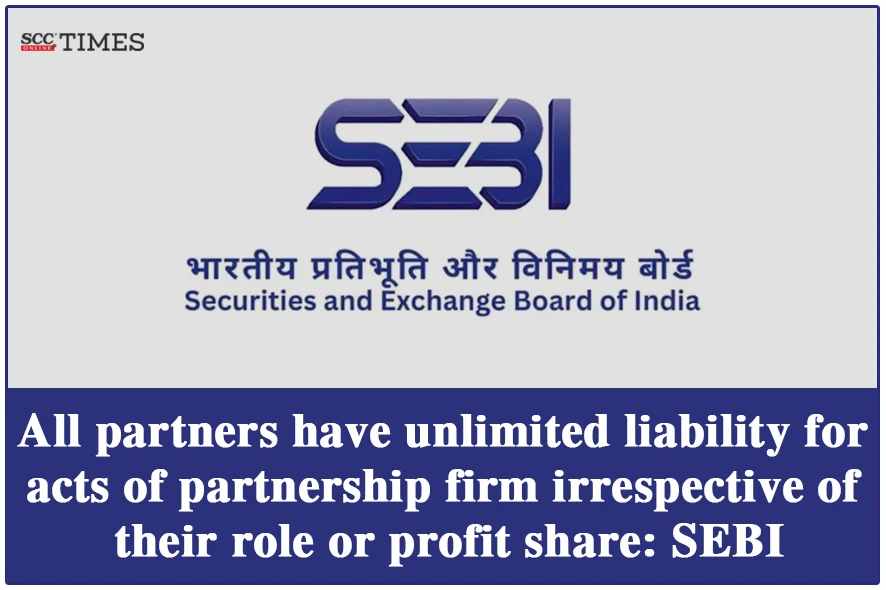Securities and Exchange Board of India (SEBI): The principle issue for determination in the present case was whether the Noticee was liable as a partner of Prowise Capital for the violation of Section 12(1) of Securities and Exchange Board of India Act, 1992 (‘SEBI Act’) read with Regulation 3(1) of the SEBI (Investment Advisers) Regulations, 2013 (‘2013 Regulation’), and Regulation 4(2)(k) of the SEBI (Prohibition of Fraudulent and Unfair Trade Practices Relating to Securities Market), 2003 (‘PFUTP Regulations’), and if so, what was the quantum of monies that she would be jointly and severally liable to refund the investors.
Ananth Narayan G (Whole Time Member) stated that since Prowise Capital is a partnership firm and all partners have unlimited liability for the acts of firm, regardless of the amount of profit or loss they individually derive. Accordingly, irrespective of their role or the extent of profit earned, every partner, including the Noticee, was liable for the acts of the firm. Thus, SEBI directed the Noticee to refund the monies monies received during her partnership period jointly and severally, with Prowise Capital and its other partners.
Background:
In the present case, SEBI had passed an Interim Order cum Show Cause Notice dated 27-07-2020, alleging illegal and unregistered investment advisory activities carried out by Prowise Capital (partnership firm) and its partners, including the Noticee. Further, the Noticee, as a partner, was held liable for violation of Section 12(1) of SEBI Act read with Regulation 3(1) of the 2013 Regulation, and Regulation 4(2)(k) of PFUTP Regulations.
Accordingly, the Final Order issued directions against the Noticee and other entities to refund the money received from investors as fees in respect of unregistered investment advisory activities. Additionally, the Noticee was debarred from accessing the securities market for period of 2 years from the date of completion of refund to investors.
The Noticee challenged the Final Order before the Securities Appellate Tribunal (SAT), on the grounds that neither the Interim Order nor the Final Order was served on her and that she came to know of the Final Order only when her husband conducted an internet search. The SAT vide order dated 15-01-2025, had set aside the Final Order in respect of the Noticee and remitted the matter back to SEBI for fresh consideration in accordance with law.
Therefore, the issue addressed in this matter was whether the Noticee was liable as partner of the partnership firm for the violation of the aforesaid provisions of the SEBI Act, 2013 Regulations, and 2003 Regulations, and whether she was liable to refund the investors. The Noticee contented that she had resigned within a short span of time and that registering the partnership firm with SEBI was beyond her scope and ability. Further, it was contended that she was not involved in decision-making or daily affairs of the firm, and that she did not receive any remuneration or profit from the partnership.
Analysis and Decision:
SEBI held that Interim and Final Orders did not record the exact period during which the Noticee was a partner. However, on perusal of the Partnership Deed, Resignation Letter, and Affidavit, it was found that the Noticee had been partner only for the two-month period between 15-01-2016 and 15-03-2016.
SEBI emphasised that the proceedings against the Noticee had been initiated under Sections 11(1), 11(4), and 11-B(1) of the SEBI Act and were quasi-judicial in nature, meaning that criminal law principles did not apply. Since Prowise Capital is a partnership firm and all partners have unlimited liability for the acts of firm, regardless of the amount of profit or loss they individually derive. Accordingly, irrespective of their role or the extent of profit earned, every partner, including the Noticee, was liable for the acts of the firm. Firm had carried out unregistered investment advisory activities from 30-01-2016 to 20-02-2020, but the Noticee was partner only for a short two-month period. Based on SEBI’s established practice, the total credits received by the firm during her partnership period, was Rs. 2,23,404.10. Therefore, the Noticee’s refund liability, along with the other noticees to the Final Order, was limited to that amount.
SEBI directed the Noticee to refund the monies received during her partnership period, amounting to Rs. 2,23,404.10, jointly and severally with partnership firm and its other partners. Alternatively, instead of directly complying with the refund directions, the Noticee was given the option to open fixed deposit account in a Scheduled Commercial Bank, deposit the said amount, and mark a lien in favour of SEBI, which would then be utilized for the ongoing recovery and refund proceedings.
Further SEBI directed that, in the event of failure to comply with these directions, SEBI could initiate proceedings under Section 28-A of the SEBI Act and take any further action as per law. As the Noticee had already undergone debarment for more than 3.5 years as per the Final Order dated 14-6-2021, it was concluded that no further debarment directions were warranted.
[In the matter of Prowise Capital, 2025 SCC OnLine SEBI-OCM 17, decided on 19-08-2025]


